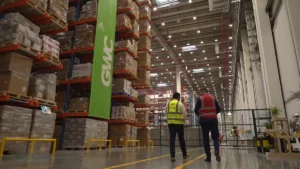Unveiling the Puppeteers of Global Supply Chains

Unveiling the Puppeteers of Global Supply Chains
Global supply chains are complex systems that are often influenced by major corporations, impacting local economies, labor rights, human rights, and the environment. “Unveiling the Puppeteers of Global Supply” sheds light on the role of these corporations in supply chains, as well as the social, economic, and environmental implications. From labor rights issues to technological innovations, this blog post delves into the interconnected web of global supply chains and the need for transparency and accountability.
Unveiling the Puppeteers of Global Supply Chains The Role of Major Corporations in Global Supply Chains
Global supply chains are intricate systems that involve numerous entities working together to bring products to consumers. Major corporations play a pivotal role in these supply chains, impacting various aspects of the process.
- Influence on Production Locations:
Major corporations often dictate the locations for production and sourcing of raw materials, affecting employment and economic development in these regions. This control over production locations can be influential in shaping the global distribution of resources and wealth. - Market Power and Negotiation:
These corporations yield significant market power, allowing them to negotiate terms with suppliers, manufacturers, and distributors. As a result, they can significantly influence pricing, production timelines, and quality standards throughout the supply chain. - Innovation and Technology Integration:
Major corporations are often at the forefront of innovation and tech integration within global supply chains. Their investment in advanced technologies and efficient processes sets the standard for the industry and influences the entire supply chain ecosystem.
Unveiling the Puppeteers of Global Supply, these major corporations weave a complex web of influence and control throughout the global supply chain, impacting economies, labor practices, and the environment.

Impacts of Global Supply Chains on Local Economies
Global supply chains, often controlled by major corporations, have a significant impact on local economies around the world. The activities of these supply chain puppeteers can lead to both positive and negative outcomes for local economies, as outlined below:
- Job Creation:
Global supply chains can result in the creation of jobs in local economies as businesses expand their operations to meet international demand. - Resource Exploitation:
However, the pursuit of lower production costs by the puppeteers of global supply chains may lead to resource exploitation in local economies, affecting the sustainability of natural resources. - Income Inequality:
The influence of major corporations in global supply chains can also contribute to income inequality within local economies, as the profits generated may not be equally distributed among all sectors of the population. - Market Volatility:
Global supply chain activities can expose local economies to market volatility, as they become increasingly reliant on international demand and supply dynamics.
In conclusion, the puppeteers of global supply chains play a pivotal role in shaping the economic landscape of local communities, with far-reaching impacts on employment, resources, income distribution, and market stability.
By being aware of the Unveiling the Puppeteers of Global Supply, local economies can better navigate the challenges and leverage the opportunities presented by their integration into global supply chains.
Labor and Human Rights Issues in Global Supply Chains
When it comes to Unveiling the Puppeteers of Global Supply, the topic of labor and human rights issues in global supply chains is paramount. Here’s a closer look at the key points to consider:
- Exploitation of Workers: Major corporations often outsource production to countries with lax labor laws, leading to exploitation of workers who endure long hours, low wages, and unsafe working conditions.
- Child Labor: In some regions, child labor is still prevalent, as companies seek to cut costs by employing underage workers who are vulnerable and easily exploited.
- Forced Labor: Global supply chains have been plagued by instances of forced labor, where individuals are coerced into working against their will, often in deplorable conditions.
- Lack of Accountability: Many times, the complex nature of supply chains allows companies to distance themselves from labor rights violations, evading accountability.
- Impact on Communities: The pursuit of cheap labor can have adverse effects on local communities, disrupting the social fabric and perpetuating cycles of poverty.
To address these issues and uphold human rights, it’s crucial for corporations to take proactive measures and ensure ethical standards are met throughout their supply chains. The push for transparency and ethical sourcing is integral in Unveiling the Puppeteers of Global Supply and creating a more equitable and sustainable global supply chain ecosystem.
Environmental Impacts and Sustainability in Global Supply Chains
When it comes to unveiling the puppeteers of global supply, it’s critical to consider the environmental impacts and sustainability practices. Major corporations play a significant role in shaping the environmental landscape through their supply chains. Here’s a closer look at the key points:
- Environmental Impacts: Global supply chains often result in extensive carbon emissions due to transportation, energy consumption, and waste generation. These impacts contribute to climate change, air and water pollution, and habitat destruction.
- Sustainability Practices: Some companies are leading the way by integrating sustainable practices into their supply chains. This includes the use of eco-friendly packaging, renewable energy sources, and efficient logistics to minimize environmental footprints.
- Comparison Table:
Environmental Impacts Sustainability Practices Extensive carbon emissions Use of eco-friendly packaging Air and water pollution Integration of renewable energy sources Habitat destruction Efficient logistics for minimal environmental footprints
Focusing on sustainability not only mitigates environmental harm but also portrays a positive image for corporations. However, there’s still progress to be made in ensuring that sustainability becomes the norm rather than the exception in global supply chains.

Technological Innovations in Global Supply Chains
In today’s interconnected world, technological innovations play a pivotal role in shaping and optimizing global supply chains. These advancements have revolutionized the way goods are sourced, produced, and distributed across the globe. Here’s how technological innovations are unveiling the puppeteers of global supply chains:
- Automation and Robotics: The integration of automation and robotics has enhanced efficiency and precision in manufacturing and distribution processes. This has led to streamlined operations and reduced operational costs for the puppeteers of global supply.
- Big Data and Analytics: By harnessing the power of big data and analytics, major corporations are gaining valuable insights into consumer behavior, market trends, and demand forecasting. This enables them to make data-driven decisions, optimize inventory management, and minimize supply chain disruptions.
- Internet of Things (IoT): The IoT facilitates real-time tracking and monitoring of goods throughout the supply chain. This level of transparency allows the puppeteers of global supply to ensure the timely delivery of products, maintain quality control, and swiftly address any logistical issues.
- Blockchain Technology: Blockchain has the potential to transform supply chain transparency and trust. It offers a secure and immutable record of transactions, thereby reducing the risk of fraud and enhancing the traceability of products from their source to the end-consumer.
- Artificial Intelligence (AI): AI-driven predictive analytics and machine learning algorithms enable proactive maintenance of equipment, demand prediction, and even autonomous decision-making in certain aspects of the supply chain.
As technological innovations continue to evolve, the puppeteers of global supply are leveraging these advancements to drive operational excellence, mitigate risks, and meet the ever-changing demands of the global market.
By embracing these technological advancements, the puppeteers of global supply are not only enhancing their operational efficiency but also redefining the dynamics of global trade and commerce.
Ultimately, technological innovations are empowering the puppeteers of global supply to orchestrate seamless and sustainable supply chains that fuel the engine of the global economy. Unveiling the Puppeteers of Global Supply has never been more reliant on cutting-edge technology.
Transparency and Accountability in Global Supply Chains
In the complex web of global supply chains, transparency and accountability are crucial aspects that directly impact stakeholders at every level. Unveiling the Puppeteers of Global Supply is imperative in ensuring responsible and ethical practices throughout the supply chain network.
- Challenges in Transparency: Major corporations often face challenges in providing full transparency across their supply chains. This opacity can lead to detrimental consequences for local economies, labor rights, and the environment.
- Accountability Initiatives: Many leading companies are implementing accountability initiatives to address the lack of transparency. By promoting ethical sourcing, fair labor practices, and environmental sustainability, these initiatives aim to hold all players accountable for their impact on global supply chains.
- Consumer Demand: There is a growing trend of consumer demand for transparency in the origin and production processes of the products they purchase. This has pushed companies to proactively disclose information about their supply chains, fostering a culture of accountability across the industry.
- Technological Solutions: Innovations in technology, such as blockchain and supply chain management systems, are paving the way for enhanced transparency. These tools enable companies to trace the flow of goods, monitor conditions, and verify compliance, thus promoting a more accountable supply chain.
In conclusion, the ongoing efforts to enhance transparency and accountability in global supply chains are vital for eradicating unethical practices and promoting sustainable, responsible sourcing. The journey of Unveiling the Puppeteers of Global Supply is an ongoing one, but it is essential for the betterment of economies, societies, and the environment.



